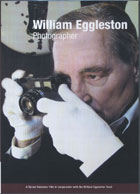
William Eggleston Photographer 2008
Distributed by Microcinema International/Microcinema DVD, 1636 Bush St., Suite #2, SF, CA 94109; 415-447-9750
Produced by Reiner Holzemer
Directed by Reiner Holzemer
DVD, color, 26 min.
Sr. High - Adult
Photography, Biography, Art, Art History
Date Entered: 06/17/2009
Reviewed by Louise Greene, Art Library, University of Maryland, College ParkIt is interesting to watch William Eggleston work. Traveling the streets of his native Memphis, Tennessee, he sizes up a scene before him, homes in on something that catches his eye, takes one decisive shot and walks away. He explains that he cultivated this discipline early in his career to eliminate the difficulty of choosing the best image later.
Eggleston taught himself photography by reading Kodak manuals in the 1950s. Later he was greatly influenced by the Decisive Moment, a collection of photographs by Henri Cartier-Bresson whose work he compares with that of the great modern painters. Initially working in black and white, Eggleston soon began experimenting with color and by the mid-1960s was working entirely in that medium. At a time when it was associated primarily with advertising, he became a master of the dye-transfer printing process prized for its saturated colors that could be manipulated in a painterly fashion.
A landmark show of Eggleston’s pioneering work in color art photography at the Museum of Modern Art in New York was mercilessly panned by critics and was reviewed in the New York Times as the “worst exhibition of 1976.” “I felt sorry for them,” Eggleston says of his critics, “they didn’t understand; it was their job to understand.”
From the outset, he has photographed the ordinary and the everyday: automobiles, billboards, interiors, people—strangers and loved ones alike—regarding them all as elements of composition, as form, motif, and color. Eggleston’s images are largely untitled and undated; he does not care to discuss his work, saying only that he photographs “life today.”
This all-too-short documentary is rich in imagery, a welcome window on the life and work of an enigmatic modern master. William Eggleston Photographer is recommended for libraries and programs with collections in photography, art and art history.